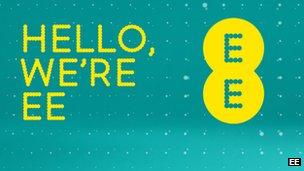EE to launch 4G mobile services in 16 UK cities in 2012
- Published
- comments
Rory Cellan-Jones tests out 4G at the news conference with Stuart Miles of the Pocket-lint website
The UK's first fourth generation (4G) mobile service will launch in 16 UK cities before the end of the year.
Everything Everywhere, which will now be known as just EE, will continue the rollout into the new year, and aims to provide 4G to 98% of the UK by 2014.
4G coverage in London, Birmingham, Cardiff and Bristol is currently being tested ahead of launching in "weeks".
Rivals have voiced concerns that EE had been given an unfair headstart by launching first.
Other cities to get the high-speed connectivity are Belfast, Derby, Edinburgh, Glasgow, Hull, Leeds, Liverpool, Manchester, Nottingham, Newcastle, Sheffield and Southampton.
'Spout unstoppably'
4G mobile technology will mean all of these locations will benefit from improved network access speeds, even indoors.
Speaking at the event, London Mayor Boris Johnson said: "I barely understand it, but information will spout unstoppably from these gizmos.
"It will bring huge advantages to anyone living or working in London."
Further rollout could prove a boon to rural areas where fixed line broadband speeds are poor.
EE will offer several handsets to use with the service. Within the year, these will be Samsung's Galaxy S III LTE; HTC's One XL and Huawei's Ascend P1 LTE.
The company will also offer Nokia's Lumia 820 and Lumia 920 - the latter of which the company has as an exclusive deal.
In addition, other devices will be launched to allow customers to connect existing equipment - such as a laptop - to the 4G network.
"4G will bring a more reliable connection," EE chief executive Olaf Swantee told the BBC.
"When you see that it can do so much more than the current network, people will have a great appetite for it."
The use of 4G will create a huge demand for data, he said - meaning networks would need to be updated.
"Our networks can cope for now but they are not future-proofed."

The 4G launch is coupled with the company's rebrand into simply "EE"
However, he refused to be drawn on media reports that Ofcom had brokered a peace deal between operators who were said to be angry at EE's early access to the 4G spectrum.
But he did say that threats of legal action were shortsighted.
"Stop using lawyers. We need to move on and get 4G infrastructure in place."
Legal wrangle
EE won permission to launch 4G services in an Ofcom ruling published on 21 August, external. In November 2011 it asked Ofcom for permission to run the high-speed data services over part of the radio spectrum it already uses for earlier generation technologies.
Rival networks are being forced to wait to launch their 4G services as they do not have any spare spectrum to use.
All operators will get a chance to buy spectrum to support 4G in 2013 when Ofcom runs an auction to divide up the radio frequencies reserved for these services.
The threat of legal action has delayed the auction and led to the UK trailing many other nations that already have fast-speed 4G services up and running.
The day after EE's launch, Apple is holding an event at which it is thought to be unveiling the next version of its iPhone.
This will also be able to handle 4G but it is not yet clear if it will work on the frequencies that EE's early services will use.
- Published11 September 2012
- Published21 August 2012
- Published24 July 2012